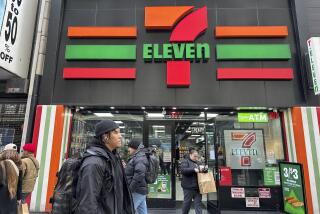Pillsbury Plans to Spin Off Ailing Burger King Unit in Effort to Discourage Suitor
- Share via
Pillsbury Co. said Monday that it will spin off its troubled Burger King fast-food chain to stockholders in a move to foil an unwanted takeover bid by a British liquor and food conglomerate.
Industry observers said the move is unlikely to help Pillsbury--which also owns such well known brands as Green Giant, Van de Kamps and Haagen-Dazs--persuade stockholders to keep their shares instead of selling them to Grand Metropolitan.
Meantime, Pillsbury, which said it is looking at more corporate restructuring, scored a significant legal victory Monday in a Delaware Court. Chancery Court Justice William Duffy upheld Pillsbury’s anti-takeover defense plan, saying the company was abiding by its fiduciary responsibilities in keeping the plan in place.
Grand Met has said its $5.23-billion offer is conditioned on Pillsbury’s voiding the anti-takeover plan. The plan would make an acquisition much more expensive by means of a so-called poison pill, which would substantially increase the number of shares that a suitor would be required to buy.
Seeks Reconsideration
The London-based company immediately requested that Duffy reconsider his ruling in light of the Pillsbury move to jettison Burger King.
“If the court upholds the defense, then Grand Metropolitan can’t do anything,” said securities analysts Marvin Roffman at Janney Montgomery Scott, a Philadelphia brokerage firm. “All bets are off.”
The court’s decision came after Pillsbury announced its plan to spin off its Burger King division, which has been blamed for eroding Pillsbury’s profits in recent years. Burger King, which accounts for about a third of Pillsbury’s annual sales of about $6 billion, has been hurt by a series of failed advertising campaigns, numerous management changes and such operational problems as inconsistent service.
Analysts speculated that the Burger King spinoff may be a ploy by Pillsbury to wring an even higher offer from Grand Met, whose $60-a-share offer expires today.
“I doubt this action by itself can come up with the value that Grand Metropolitan is putting on the total company,” said securities analyst Nomi Ghez at Goldman Sachs. “This is mostly a maneuver in the total game.”
Levin Would Run Firm
“The move by Pillsbury management is a case of too little too late,” said analyst John M. McMillin of Prudential-Bache Securities. “We have been telling management to do this for two years. They gave me no reason not to tender my stock (to Grand Met).”
In a statement, Pillsbury Chairman Philip L. Smith said: “The spinoff of Burger King will create two major public companies that are clearly focused and are leaders in their respective industries. Pillsbury will emphasize primarily the company’s consumer foods group, while Burger King will concentrate all of its efforts on its restaurant operations.”
The independent Burger King would be headed by its current chairman, Jerry W. Levin, who was appointed to the position only two weeks ago. Levin said he had proposed the spinoff of Burger King to Pillsbury’s board.
“I believe that Burger King is best equipped to achieve a full and lasting turnaround as a separate and distinct entity,” Levin said in a press a conference in Miami, where Burger King has its headquarters.
Under the plan, Pillsbury will issue a share of stock in the new Burger King Corp. for each existing Pillsbury share. After the spinoff, Burger King Corp. will give shareholders cash and securities.
Burger King franchisees will be offered an interest in the new company and representation on its board. Many disgruntled Burger King franchisee have complained in the past about the chain’s flagging sales and management’s inability to stage a turnaround.
Although Pillsbury’s plans lacked many details, some analysts say a share of the new Burger King would be worth at least $13, excluding the additional cash and securities that would be paid after the spinoff.
However, there was concern that Pillsbury and the newly independent Burger King would be saddled with too much debt associated with the spinoff and any potential new restructuring. Grand Metropolitan, which has said it would keep Burger King, sharply criticized the Pillsbury plan.
“The heavy financial burdens imposed by such a highly leveraged plan may weaken the companies’ ability to build their businesses, to avoid large-scale layoffs and plant closings, and to maintain current levels of commitment to philanthropic activities,” said Ian A. Martin, who heads Grand Met’s U.S. operations.
More to Read
Inside the business of entertainment
The Wide Shot brings you news, analysis and insights on everything from streaming wars to production — and what it all means for the future.
You may occasionally receive promotional content from the Los Angeles Times.










